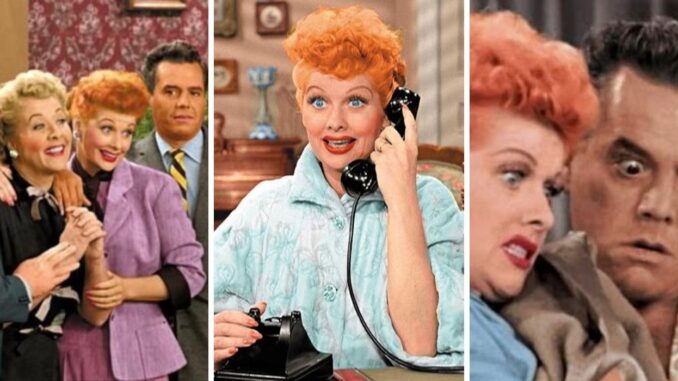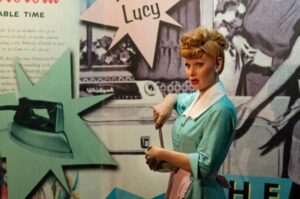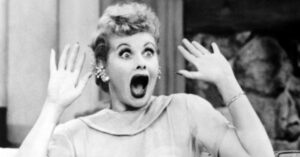
“I Love Lucy” is one of the most beloved sitcoms of all time, but what if the classic, lighthearted show had a darker side that most viewers missed? A growing number of fans believe that behind the laughter and slapstick humor, there were deeper, more somber themes lurking just beneath the surface. Could it be that “I Love Lucy” wasn’t just a fun, wholesome show but something much more complex? Let’s dive into the fan theory that suggests “I Love Lucy” was a lot darker than we ever imagined.
The Fan Theory That Changes Everything
When we think of “I Love Lucy”, we picture Lucille Ball’s iconic antics, Ricky’s exaggerated frustration, and the feel-good humor that made the show a household name. But some fans argue that beneath all of that, the show subtly addressed darker themes like control, emotional manipulation, and even societal expectations.
Was Lucy Really Trapped in a Toxic Relationship?

One of the key elements of this fan theory revolves around Lucy and Ricky’s marriage. While the couple’s dynamic was often portrayed as comedic, there are moments in the show where their relationship feels far from healthy. Ricky constantly tries to control Lucy’s behavior, dismisses her dreams of stardom, and even gaslights her when things don’t go his way. Could this be an underlying commentary on the gender roles and expectations of the 1950s?
Gender Roles in 1950s Television
Back in the 1950s, television reflected the societal norms of the time, and “I Love Lucy” was no exception. Lucy’s character, though strong and ambitious, often found herself trapped by the limitations placed on women of the era. This fan theory suggests that her constant attempts to break free – whether through career aspirations or simply having more control in her marriage – mirrored the struggles of many real women during that time.
The Themes of Control and Power Struggles
Throughout the series, Ricky’s controlling behavior can be seen as a symbol of the power struggles between men and women in a patriarchal society. Ricky was the breadwinner, and Lucy was the stereotypical housewife. Yet, Lucy was constantly trying to push the boundaries of her role, seeking independence and validation outside of being “just a housewife.”
Was Lucy’s Desire for Fame a Cry for Help?

Another intriguing aspect of the fan theory is Lucy’s endless quest to become famous. While her failed auditions and comedy routines provided great humor, some fans wonder if this was more than just slapstick. Could Lucy’s constant desire for recognition represent a deeper emotional void or her dissatisfaction with her role as a wife and mother?
The Darker Side of Comedy
Comedy, at its core, often stems from pain, and “I Love Lucy” might be no exception. Lucy’s misadventures and constant failures to gain the recognition she craves could hint at an undercurrent of sadness. Her exaggerated actions and endless plotting might have been ways to mask deeper feelings of inadequacy or unfulfillment.
The Influence of Desi Arnaz Behind the Scenes
Ricky Ricardo wasn’t just Lucy’s on-screen husband; Desi Arnaz, who played Ricky, was also Lucille Ball’s real-life husband. Behind the scenes, Desi had a significant influence on the show’s production and storylines. This duality makes fans wonder: Was the control dynamic we saw on screen a reflection of their real-life relationship as well?
Parallels Between On-Screen and Real-Life Marriage
Lucille Ball and Desi Arnaz’s marriage was far from perfect, and some suggest that their real-life struggles may have bled into the show’s storyline. Desi, like Ricky, was known to have a strong personality, and the tension between them in real life may have fueled the comedic tension that made “I Love Lucy” so iconic.
Lucy’s Character Development – A Journey of Resistance?
As the series progressed, Lucy’s character became bolder, more defiant, and more determined to stand up to Ricky. This character development could be seen as a subtle nod to the changing gender dynamics in the 1950s, as women were beginning to question their roles in society and demand more independence.
Was Ethel Mertz More Than Just a Sidekick?
Lucy’s best friend, Ethel Mertz, often served as her partner in crime. However, Ethel’s own marriage to Fred Mertz was also portrayed with a certain level of dysfunction. Some fans believe that Ethel’s character was more than just comic relief; she was another example of a woman struggling with societal expectations and a controlling husband.
The Mertz Marriage – A Reflection of Middle-Class Struggles
Fred and Ethel’s relationship was often strained by financial issues and power dynamics, which could be seen as a reflection of middle-class struggles during the 1950s. Their marriage wasn’t ideal, but it provided a more relatable, grounded counterpoint to Lucy and Ricky’s often glamorous life.
The Hidden Social Commentary of “I Love Lucy”
While the show was first and foremost a comedy, it also subtly reflected the social issues of the time. From the portrayal of gender roles to the challenges of marriage, “I Love Lucy” offered a comedic lens through which viewers could explore deeper societal concerns.
How Audiences Missed the Deeper Themes
Because “I Love Lucy” was packaged as a lighthearted sitcom, many viewers may have missed the more serious undertones. The laughter and slapstick humor often overshadowed the show’s potential commentary on issues like control, power, and gender dynamics.
Why This Fan Theory Resonates Today
In today’s world, where discussions around gender equality and toxic relationships are more prevalent, it’s no wonder that this fan theory is gaining traction. What seemed like harmless humor in the 1950s might be viewed differently through a modern lens, leading many fans to reassess the show’s deeper meanings.
Revisiting “I Love Lucy” with Fresh Eyes
Whether or not you buy into the darker fan theory, it’s undeniable that “I Love Lucy” remains a cultural touchstone. But watching it now, with today’s understanding of gender roles and relationship dynamics, might just reveal a different side to the classic sitcom that many of us missed the first time around.
Conclusion
While “I Love Lucy” will always be remembered for its groundbreaking comedy and unforgettable characters, this fan theory presents a fascinating new way to view the show. Perhaps the next time you watch Lucy’s hilarious antics, you’ll wonder if there’s more going on beneath the surface. The theory might not be universally accepted, but it certainly adds a layer of complexity to the show’s seemingly simple premise.